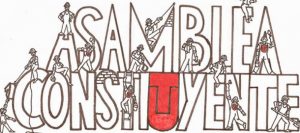Photo: Milena Reyes, integrante de la Delegación de paz de las FARC-EP
As the peace negotiations continue to progress, Mike Mackenna takes a look at some of the debates taking place throughout the country that will impact the way the final deal gets implemented
The FARC in Congress
While commentators lauded the negotiating tactics of agreeing to political representation for the FARC as part of the agreement reached on September 23, the realities are more complex.
It’s only natural that people who want to understand the FARC peace talks try to compare it to other recent peace processes in other countries. And, where appropriate, it makes sense to draw lessons from their experiences.
However, when it comes to the question of political representation, comparisons with countries like South Africa, El Salvador, Nicaragua and Northern Ireland are not helpful because the FARC have very little political support in comparison to the insurgent groups in those countries, three of which held presidential office shortly after demobilizing. Based on the FARC’s poll numbers and electorial history, there is little reason to think they will have that kind of electoral success.
History of FARC and electoral politics
In 1986 the FARC formed a political party, along with other Colombian leftist movements, as part of peace talks the FARC were participating in at the time. The party, called the Unión Patriotica (UP), won 14 of 114 seats in Congress, receiving 1.5% of the total votes.
Things have not improved since then. As the violence has intensified, claiming victims on all sides, ncluding more than 3,000 murdered UP members, the FARC’s popularity remains low. Timochenko, their leader, has an approval rating of just 9%, which is actually an increase from the 6% he received in June. According to recent media reports, 71% of Colombians think the FARC should go to prison, and 80% are opposed to their presence in Congress.
It is understandable that there is widespread opposition to the possibility of someone like FARC Commander Iván Márquez becoming a congressman. It is also understandable that given the FARC’s lack of popularity, and history of being violently repressed politically, they would push for guaranteed seats.
President Santos has defended the idea, asking, “Is that too high a price to end 50 years of war?” The challenge is that there are a number of Colombians who will tell him emphatically that it is, indeed, a price too dear.
How to let the people decide?
As the negotiations in Havana move forward, one issue that is hanging over the process is the way that the agreements reached will be signed off by both the government and the Colombian people.
President Juan Manuel Santos has been getting criticism from all sides for his proposal to let the people approve an eventual deal through a plebiscite, while the FARC are calling for a constitutional assembly. What exactly are they and why have they caused such controversy?
President Santos’s proposal: A plebiscite
A plebiscite would give Colombians a simple choice: yes or no to the peace agreements. Unlike a referendum, it would not require a vote on every aspect of the agreement, but only a ‘yes’ or ‘no’ for the agreement as a whole.
The only proper plebiscite in Colombian history, known as the Septima Papeleta, was in 1990, when the people voted to form a constitutional assembly, which led to the writing of the 1991 constitution that is still the law of the land today.
The other was the so-called plebiscite of 1957, in which the people voted to revert to their 1886 constitution, concluding a four-year period of military dictatorship. This was actually a referendum, though, since it required people to vote ‘yes’ or ‘no’ on a list of reforms.
The case for: President Santos hopes to deflect criticism that the process is undemocratic by giving Colombians a chance to vote on an eventual peace deal, even though he is under no legal obligation do so, and it has not happened in previous peace processes here.
The government describes it as “totally transparent and democratic”, and as a way for them to fulfil their promise of letting the people decide the outcome of the talks. The president fears a point-by-point referendum could seriously damage the agreements, since “half the points could be approved, and half rejected”.
The case against: For its critics, its simplicity is its fatal flaw. Álvaro Uribe claims that reducing the whole process to a simple ‘yes’ or ‘no’ is “dictatorial”. “Citizens have a right to examine the agreement point by point,” he said.
The FARC and the leftist Polo party, for their part, consider it a unilateral imposition of the government, which has not been negotiated in Havana.
FARC’s proposal: A constitutional assembly
In a constitutional assembly, the people elect delegates to write a new constitution together, though the FARC are proposing that the elections would not apply for the FARC’s own representatives.
An example of this is that there were 24 members of the terrorist groups in the constitutional assembly of 1991, which included the M19, EPL, PRT and Quintin Lame; who had demobilised just prior to the Assembly. The 20 members of the M19 had been elected to the Assembly, but the four members of the other groups were not.
The case for: The FARC think the assembly would give the peace agreement more legitimacy, and would let them protect the agreements from being changed by future governments. It would inspire a “great national political agreement” and be an “elevated form of political participation”, according to FARC chief negotiator Iván Márquez. The FARC say the assembly could represent virtually every sector of society: indigenous people, Afro-Colombians, small-scale farmers, victims of the conflict, students, women’s rights advocates, union representatives, LGBTI representatives, retired military, and the traditional political powers.
In a truly surprising illustration of how politics makes strange bedfellows, Uribe, the FARC’s mortal enemy, supports them on this. His party, Centro Democratico, claims that the assembly would help them readjust the balance of power they feel has tipped too far towards the president, though his critics claim Uribe’s motive is to change the constitution to be allowed to run for president again.
The case against: President Santos asserted that the FARC want to “erase everything we have done and start over” in the assembly. He contends that the assembly would not be a referendum on the agreements, but rather a chance for the FARC to completely rewrite them.
Semana magazine added that it would be a chance not just for the FARC, but also for congress, to rework the agreements, saying it would leave the Havana agreements subject to the “eternal and complex procedures” of the legislature.






